| |
"No one, on pain of being designated fifty types of watery twat, ever dare repeat that feeble, ignorant, self-satisfied canard ever, ever again. Americans are no more irony illiterate than Britons or anyone else and the repeated assertion – and it is no more than an assertion, not a demonstrable, provable fact – is no more than a pathetic symbol of a certain kind of Briton's flabby need to convince themselves of their sophisticated superiority over the average American..." |
| |
Stephen Fry, quoted from one of his recent Podgrams,
"Bored Of The Dance", March 2008 |
It is said that travel broadens the mind – even one as educated and as wise as Mr. Stephen Fry's. Before his significant U.S. jaunt, Fry was not above taking a few pot shots at Americans and America on his show QI. I doubt those casual critiques would come quite as easily now. In lifting the grubby veil of supposed and erroneously vaunted superiority from his own eyes, he attempts to do the same for the rest of us. The result is six enlightening hours of gently probing TV.
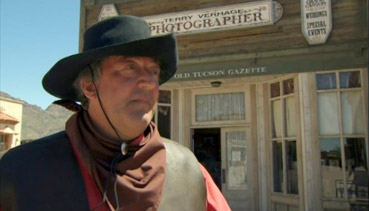
It's safe to assume that Fry, due to his ubiquitous broadcasting, has attained the status of national treasure. For my very heartfelt and sincere appreciation of the man, please take a dip into the first few paragraphs of my review of the Dutch movie, Discovery Of Heaven. He's an actor, a cultural commentator and an all-round mensch-for-hire for those events that need a frisson of naughtiness while remaining essentially and irredeemably civilized. He also provides character voice-overs for cartoons (!). Please see the BBC's Secret Show. I know, I know. He'll turn up in Corrie next. His polymathy is eye-poppingly prodigious and through his presentation of the estimable QI, he gives the very real impression that there is nothing he doesn't know or isn't at least considerably well aware of.
Stephen Fry is not only independently wealthy (the first tsunami of Fry-bound readies came from some serendipitous early writing assignments – which is not to underestimate his talent as a scribe), but he is also the 21st century's Quentin Crisp (in turns much tidier and larger). Fry is known nationally for his humour, his intelligence, his healthy obsession with Oscar Wilde, his z-shaped 'broken when a child' nose, his Norfolk roots, his homosexuality, manic depression and a seventeen year period of celibacy. He is also uniquely safe, cocooned within a very British constitutional hierarchy. I mean, Prince Charles is one of his mates. The self-outed gay details (usually salaciously jumped upon by unforgiving print-rags) are "forgiven" (as if they need to be) because he plays other establishment roles so effortlessly well. He is as 'bowler hat and brolly' as it comes and yet there is a wonderfully subversive side to Fry. He has the intelligence, like Python in the early years, to generate very sophisticated humour and yet, he rarely alienates the 'common man', whoever he or she may be.
Fry, above so many odds they're incalculable, is class-proof. He's middle-class with oars in all camps, camp and butch alike, the poor and well off, the sick and the healthy. He seems to find the human being in amongst the tabloid presumptions and seems to speak directly to that human being. He's no white clad knight and has his moments of being haughty and opinionated but I have yet to find an opinion of Fry's that I disagree with or have any issues with. So this is a review of six solid hours of informed entertainment. If you want the capsule review, here it is; do you like Stephen Fry? Yes? Then I recommend the series without reservation. No? Then I still recommend it for the clichés it cheerfully trashes. It's come at a significant time. Can Obama do for US politics what Fry has done for the average American? Now all fifty states visited in what I imagine was a filming period of about three to four months (by London cab) is still one hell of a rush – in the sense of Senör S. Gonzales, not nicotine. So some places are going to get shortchanged. Poor old Washington State... I did California and Nevada myself earlier this year in ten days and I barely scratched either's surface. Still, busy men must get on...
Let's have a trawl through the highlights:
1. New World
From the opening montage – sprightly cut to 'America!' from West Side Story – it is clear that Stephen Fry is a very lucky man. In a few short months he has ticked off experiences that most of us would be lucky to manage a tenth of in a single lifetime. But I can think of no better ambassador for the UK – virtually unknown in the US, unlike his best friend, Hugh Laurie, now a House hold name, Fry moves effortlessly from putting lobsters in trances to waxing smart on the US political system. The photography is measured (my term for "they sometimes used a tripod") and at times quite stunning – America helps, of course. It is a beautiful country, whatever your politics. Fry meets a gay, black Republican in Massachusetts and that's a wonderful old chestnut smashed in the simple shaking of a hand.
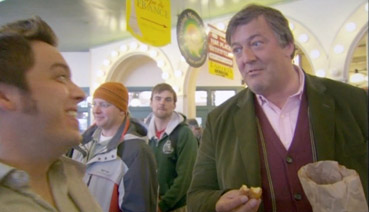
From the sublime to a woman whose religion is Witchcraft. Here is Fry's gift writ large. In private, I'm certain he would dismiss these people as ignorant, self-deluding buffoons but he's here as a guide, not a rational and opinionated human being. Show what you see and don't judge. Fry manages the high wire act with aplomb. This isn't a cynical Therouxvian wink at the lens. It's a serious "show and tell". But then there's always the commentary for a slice of honest appraisal. New Jersey's tacky casinos are given the thumbs down with the opinion "...vulgar, tasteless and desperately sad. But maybe that's just me." No, Stephen, it's not. But the proviso is awfully welcome.
2. Deep South
Fry pushes past the literal Mason Dixon line crossing from the north of North America to the south. Game to try most things, he becomes a miner for a few hours and the one thing that Fry does well is let his impeccable performance reveal a little, but very real, angst. The shot of the mining tunnel can induce claustrophobia let alone send claustrophobics screaming from the room. Kentucky reveals ass-tattooed youths and auctioneers using their tongues like a banjo plectrum. What a lovely word 'plectrum' is if I may wax Fry-like. On to real plectrums preceded by a Barber's shop where Fry (at last) is complimented on his accent in one scene and in another, in a music joint, he hears "Y'all talk funny over there, right?" Yeah.
The visit to the body farm will be remembered (the location of a forensic science discipline of studying rates of human decomposition etc.). You could almost smell the death through the TV. On to a hot air balloon and Jerry Goldsmith's chilling main theme to Alien pops in here for no apparent reason. As Fry leaves the ground, I remembered my own experience with such a serene mode of transport. I recommend a balloon flight to everyone. It's utterly magical. Compare this with Fry's getting on a horse...
Pre-shadowing my general comments at the end of each of the six capsule reviews, I must make some noises about the editing of the series. As Fry, with real fear in his voice, slowly canters when he was promised the horse would only walk, there is a zoom in (perfectly acceptable in docs when unexpected things happen) but once the cameraperson ends the shot (the camera tilts to the grass as he/she runs to catch up with the action) the editor has kept this movement in... It's the equivalent of serving a fried egg with its shell on the side. This piece of tape is mere detritus. What's it doing being left in? I suppose when flash frames became de rigueur (film over exposes over a few frames once it's physically stopped in the camera) in modern film grammar, the crap camera movement at the end of a tape shot joins it in post production post-modernity? Oh, god.
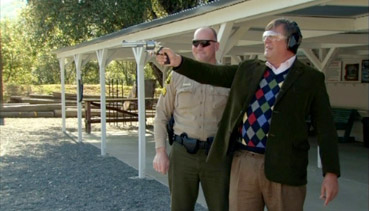
After a rather more sedate Thanksgiving Dinner and trashing Miami with a few throwaway ultra-critical observations, he ends up at a football game (with accompanying jet fighters overhead) and again, the Alien main theme makes an audible appearance – just plain weird.*
*Just got a call from friend and composer Debbie Wiseman (after my enquiring e-mails) who explained that she did the main theme to all episodes and music for the odd numbered episodes so in order to figure out the Alien cue's inclusion, we'd have to talk to the editor of the even numbered shows. Too much detail methinks. Let's just say "because she/he liked the cue..." and leave it at that. It's still weird though, like scoring Dirty Harry with a xylophone and kazoo.
3. Mississippi
And at last the giveaway that this series is not a continuous, unbroken whistle-stop tour. Fry sports a broken arm here, sustained by deftly un-negotiating the gap between a boat and its jetty on the shoot of an TV update of Mark Carwardine and Douglas Adams' radio series Last Chance To See. Looking forward to that one. So here we are, Mardi Gras, in New Orleans. It still surprises me to find in a civilized society a belief, in of all things, voodoo. Fry covers it with a bemused detachment. Hurricane Katrina's effects are witnessed and at Angola State Penitentiary in Louisiana, hope springs if not eternal then certainly day by day from some enlightened wardening. You really do get a sense of the size of this country in this series. One minute, it's a bustling city and the next, paddling down the Mississippi, there's not a soul to be seen.
Rarely do the producers give the participants a great deal of time but Fry's meeting with Morgan Freeman, whose music venue 'Ground Zero' affords the septuagenarian some 'quietude', is very nicely judged. Freeman provides Fry's wanderings with some grammar, a pause before the next whirlwind whiz through a place made world famous by one facet of its character. It's a small detail but revealing. The cynic inside me (allied with decades in the business) makes me think that Fry only ever drove his black cab when on camera. I imagine the crew popping the distinctive vehicle on the back of a truck and traveling en masse to wherever next. I say this because there were POV shots of Fry driving, his right hand on the wheel inter-cut with shots of Fry himself, his right hand very much out of commission in a sling. You do what you need to do to get the shot – everything else is done to make cast and crew lives easier and every so often the artifice pokes its head above the wall and people like me gleefully take a pot shot.
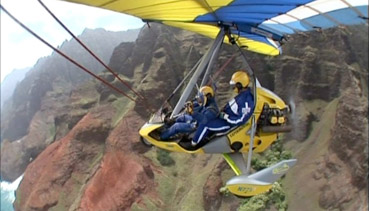
But I will say that I'm finding the series delightful despite the conceit that tries hard to make us believe that Fry is driving everywhere himself. He would be exhausted and not up to eliciting any energy in presenting at all. I may be wrong and will be happy to be proved thus but I make TV and with reduced time and budgets, you do what you have to by the easiest means available to you. The slow decline of the blues in Chicago is visibly witnessed by the bare, icy lots on which once stood lively music clubs and Fry gets to perform at Second City, Chicago's improv comedy club. From Oscar making to acknowledging immigrants' desires to live in, of all places, the wreathed-in-white twin cities of Minnesota and St. Pauls, Fry ends up on ice.
4. Mountains and Plains
Homeland Security. Such a scary phrase. We must now treat all of you like prospective Al Qaida in order to winkle out the 0.000001% of those citizens who intend to do the US harm. Here Fry struggles with a border guard who gives the impression that he is merely indulging the whims of the big man from the BBC. But then again, at the 49th Parallel, who wouldn't want to be in the US and Canada simultaneously? There are dire predictions for the glaciers of Montana and a meeting with Ted Turner (he of CNN fame) and Fry trips over a few times allowing Turner to make Fry sound like an idiot and how difficult is that? I'll make another point about the series' editing. Well, at the Continental divide between Montana and Idaho, there is one of the most dreadful cutaways I've seen on TV for a long time – just check out the insert of the water bottle. This, of course, is not the editor's fault.
Eking a living from a Wyoming wilderness seems like a hard life. It's not made any easier by the law against killing wolves. And as liberal as you might be and supportive of the preservation of the wildlife, it still hurts like hell when the bastards eat your dogs and horse. It's the presence of the native Indian population in this episode that tugs at the gut. It's hard to say that America as we know it started with a genocide but despite its haphazard nature, it has an element of truth to it. Once the language goes, there goes the culture seems to be what most are fearful of. Film buffs note, yes once again, the only piece of music deemed appropriate enough for Mount Rushmore is... care to guess?
Two gems from this episode are mutton busting and the truckers' shop. Kids play rodeo but on sheep, something I'm sure my son would have loved but UK Health and Safety (two of Fry's least favourite words) would not let him get anywhere near a bucking, uh, sheep. The truckers' shop is a classic – loads of stuff bedecked with smiling thumbs-up truckers and Fry trying his best to interpret what some of these odd items actually are. And wouldn't you like to drive on a beach? Welcome to Texas (the size of France incidentally and that's bloody enormous)...
5. True West
Now he's in a balloon over the Rio Grande rift. I tell you, this Fry is a lucky sod. The south west of the US is apparently the 'true' west. This is John Ford country. Incongruously, we find human detritus outside a house of the future. We're not talking Jacques Tati's future house from Mon Oncle (which incidentally contains one of the best movie jokes ever), we're talking about power saving and the ultimate in recycling (using your own feces to grow food – now why don't we do that?). In Los Alamos, Fry visits the Quark Bar where the atom was split and the atomic age was ushered in. He mentions that he believes in science (I can't see Fry as a religious man, he's too well informed).
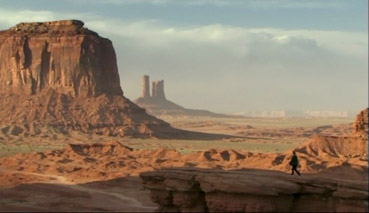
There is a lovely story about how John Ford was seduced to shoot in Monument Valley and Fry gets a brief submersion into a native Indian lifestyle. Fry's interest in basket weaving is nicely judged (you have to remember that he is a performer and as much as we think we are seeing the real 'Stephen Fry', he's doing his job – broadcasting things of interest). But Monument Valley is unbelievable, just awe inspiring. In this episode, there is a curious mis-step all in the name of playfulness. You know when presenters say "Oh, I've always wanted to do that..."? It usually means a little bit of acting. Fry is an actor but with a fairly narrow range. I mean you wouldn't buy him as Neo in The Matrix. Neither could you picture him as a cowboy. But it's not Fry's performance that's an issue. It's his enemy's. There's that forced fakery that should be playful but comes across as somewhat embarrassing.
Mormon missionaries (wincing yet?) are photographed for a calendar (oh, buy me one!). But even here, faced with a made up religion, Fry is extraordinarily tolerant. I'm reminded of Gregory House's dismissal of Mormonism and suspect Fry's own good sense would summarily dismiss Joseph Smith's ravings for the idiot-trap it is. For a real eye opener, the interview with the Nevada prostitute is glorious. She enjoys her job so much so that she admits to climaxing while working and for some reason that made me smile widely.
6. Pacific
In geek heaven, Fry's second San Francisco contact, after the Chinese fortune cookie baker, is the man who designed the iMac and iPod, Jonathan Ive. As exciting as this was (on a San Francisco rooftop, my favourite city in the world), you have to accept a frisson of "Whoah!" when Fry is offered a Magnum to fire. Now, how many guns have you (I think the verb is) discharged? Fry is six foot four and not as light on his feet as the stick insect he used to be but still that handgun whip-cracks his arm back as if a child's. Clint Eastwood has a lot to answer for. But it's doubtful after the first shot, Eastwood would have exclaimed "Mummy!" Pure Fry.
After the rather sad spectacle of seeing scores of marijuana plants cut at the root and thrown on a lorry, wood chipper bound, we move off to counter-culture Carmen King singing about having some dirty girly fun. The discovery of vole nests in the trees enables environmentalists to keep preserving the forests and as a sort of mirror image to this we hear from a man whose family were put in jeopardy by Big Foot, Oregon's most enduring myth. Matt Johnson gets quite choked up telling the story but has the theory that if the animal's existence was confirmed, logging would be barred in some areas – good news for an imaginary man-beast, not so good for the wood industries.
In Seattle, Fry gets his taste buds tickled (a recurring theme throughout the series) and meets up with Barney, a harbour seal with some dental issues and a pair of sea otters. In Washington State, the cab is left behind as Fry gets to tick off No. 48. I bet the residents of Washington State weren't too chuffed with the BBC. Fry comes all this way to 'do' every state and Washington State ends up as a car park covered in about three shots. In Alaska, the Russian influences in religion come through while the beauty of the place takes your breath away. There's real rapport with Alaskan fisherman Lee but the line of this show is, Henry, the Inupiak Indian's answer to Fry's question "So do you navigate by the stars?" "Yes, the stars... and GPS." The best moments of this series always pull you up short with one of your own prejudices skewed.
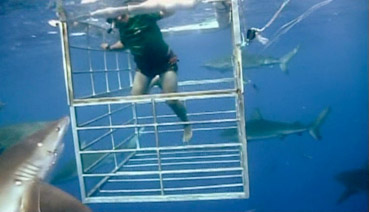
Ending his jaunt in Hawaii, Fry ends up diving with sharks. There is a huge, one assumes, viewing hole in this cage. But it seems big enough for one of these sharks to make a fry up. After a short, scary flight to Kauai, we enter the land of Lost and Jurassic Park ending the trip with Alex at a massive observatory on Big Island and the lava flows of volcanoes making more 'America' every day as the lava solidifies.
General Overview: Episodes 1 to 6
Over all six episodes is an apposite, bespoke music score by Debbie Wiseman, Molly Nyman and Harry Escott, which is as gentle and accommodating as its host. The music is never trying too hard and moves Fry along with some grace (and I'm not just saying that because I've worked with Debbie). The point is that the editing is almost the exact opposite. Of course, there are the obligatory and very necessary cutaways but I wonder why they are used when there are so many – seemingly easily accepted – pug-ugly jump-cuts.
With a hand held camera, I suppose that kind of editing (nails down a blackboard to me) is required but as an editor with two and a half decades of experience, I know that there's always an answer, always a solution (if your cameraperson knows what they're doing and you have the time to think). But again, it could be a truncated post-production issue. The philosophy born of penny-pinching TV these days, that one of "It'll do," is something that's always seemed tasteless and graceless to me. But if episodes 1, 3 and 5 are being cut the same time as 2, 4 and 6, then compromise has to be accepted as the order of the day. A shame. But to a modern audience unaffected by this crunch time "It'll do..." post production, I suspect these niggles are paltry and even (probably) unnoticeable. To me, they are like neon signs of desperation.
Shot, I imagine, on HD Tape (I caught glimpses of the camera in a few New Jersey casino shiny surfaces) in anamorphic 16x9, the picture looks terrific on an SD TV. There has obviously been some time taken over the look – warm and inviting mostly because as I mentioned America is gorgeous and with a colourist who knows his colour wheel, the New England autumn (or 'fall') should look good enough to eat.
The Dolby Digital soundtrack is, as to be expected, top notch with pleasing surround effects that add to the gentle atmosphere of the whole venture. There are no subtitles nor closed captioning.
Disc One – Deleted Scenes
'Left Right, Center' Dice Game in Eastport, Maine (1' 57")
Bar-room shenanigans with a playful betting game – dice are rolled and money is passed around until one lucky winner scores the lot. Did I hear Fry actually say "Awesome!" at the end? Hope not.
Whale Talk with author Nathaniel Philbrick in Nantucket, Massachusetts (2' 40")
In conversation, the pair walks past a whale skeleton and even in this state, it still looks majestic. You have to excuse my enthusiasm as I saw my first whale (in the wild) this summer. Philbrick is a good spokesman for a questionable past activity but pretty scores over historical awfulness.
Pilgrim Father on the Mayflower at Plymouth Rock, Massachusetts (5' 06")
The propensity for play-acting carries on as a 'real' Pilgrim Father conducts a passionate conversation albeit in a temporal rift. The Pilgrim doesn't break character for a moment even when Fry is 'able to see the future of America'... the fattest bottomed race on earth. And Fry's little glance at the tail of the excerpt is as good as a wink.
Disc Two – Deleted Scenes
The Peabody Duck Hotel in Memphis, Tennessee (1' 44")
Uh... tame ducks, red carpet walking and swimming in a hotel lobby. OK. I guess it's about time you get a "Only in America..." from me.
Judd and Art Finkelstein's Garage Winery, Napa Valley (4' 57")
After thoroughly enjoying the unashamedly California boosting, French bashing independent movie, Bottle Shock, it's nice to see real Californian Vintners at their trade.
Oyster Fishing with John Tesovic in the bayous of Louisiana (4' 57")
I guess the above says it all. What you're unprepared for is Tesovic's ancestry – Croatian! Fry gives in to some very real English prejudices about the French (playful, not snide).
Stephen Fry in America is a delightful and canard smashing trip zipping through the States at breakneck speed. It's six hours of 'stuffed to the gills' TV. There's history to pick up, personalities to revel in and Fry's own gentle, self-effacing character guiding you forward. Excellent and highly recommended if you want to let America slowly back in to the world's play-room so to speak. I, for one, will be very happy to see that happen.
|